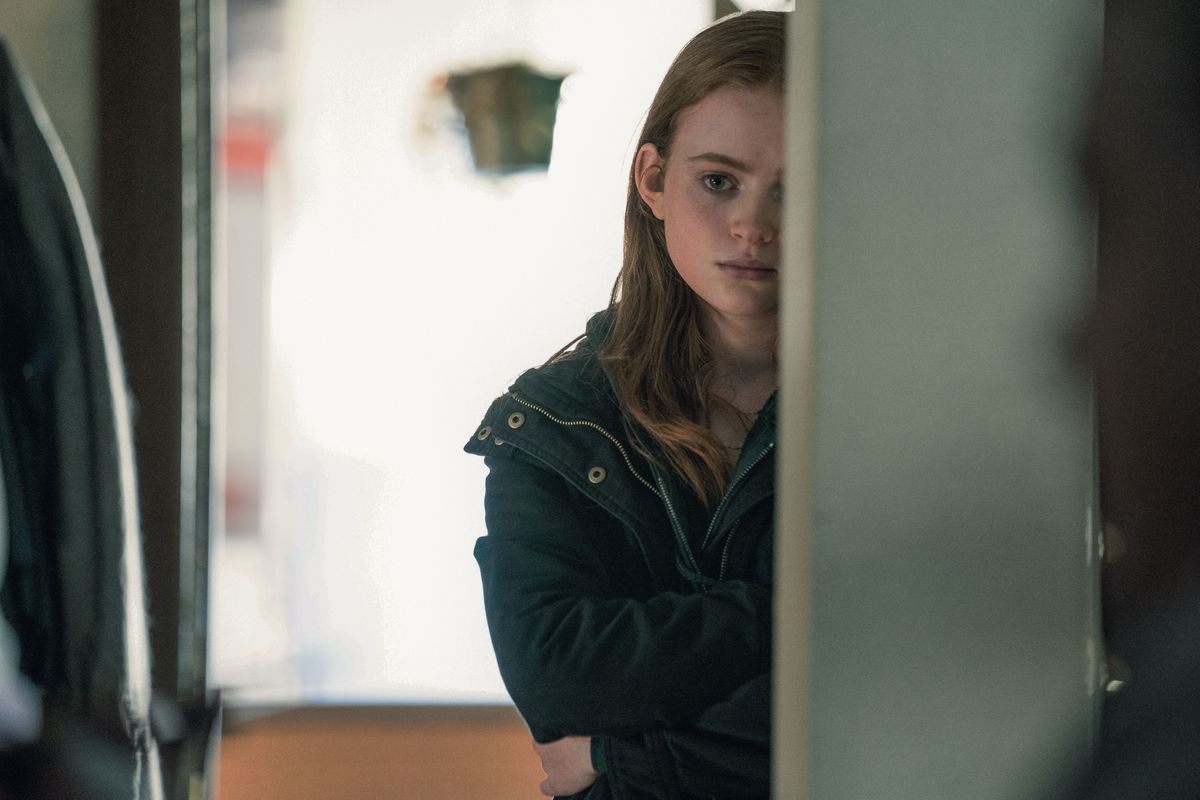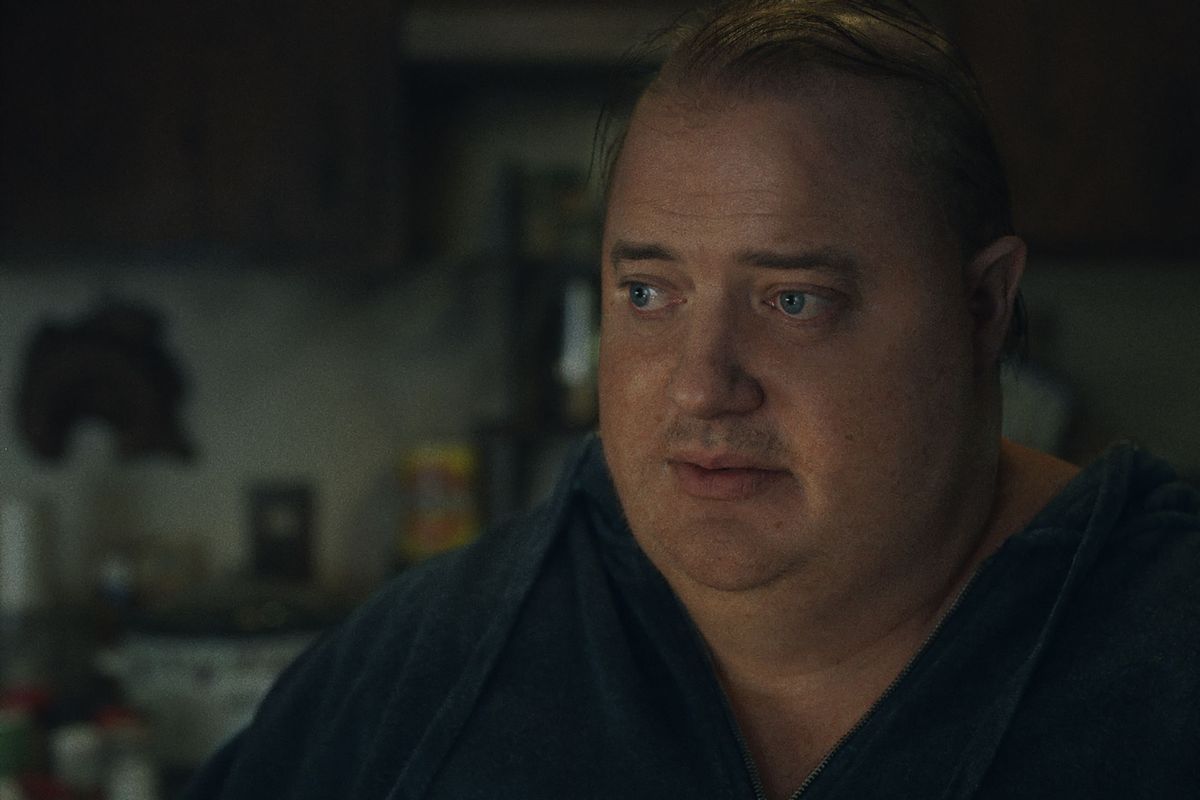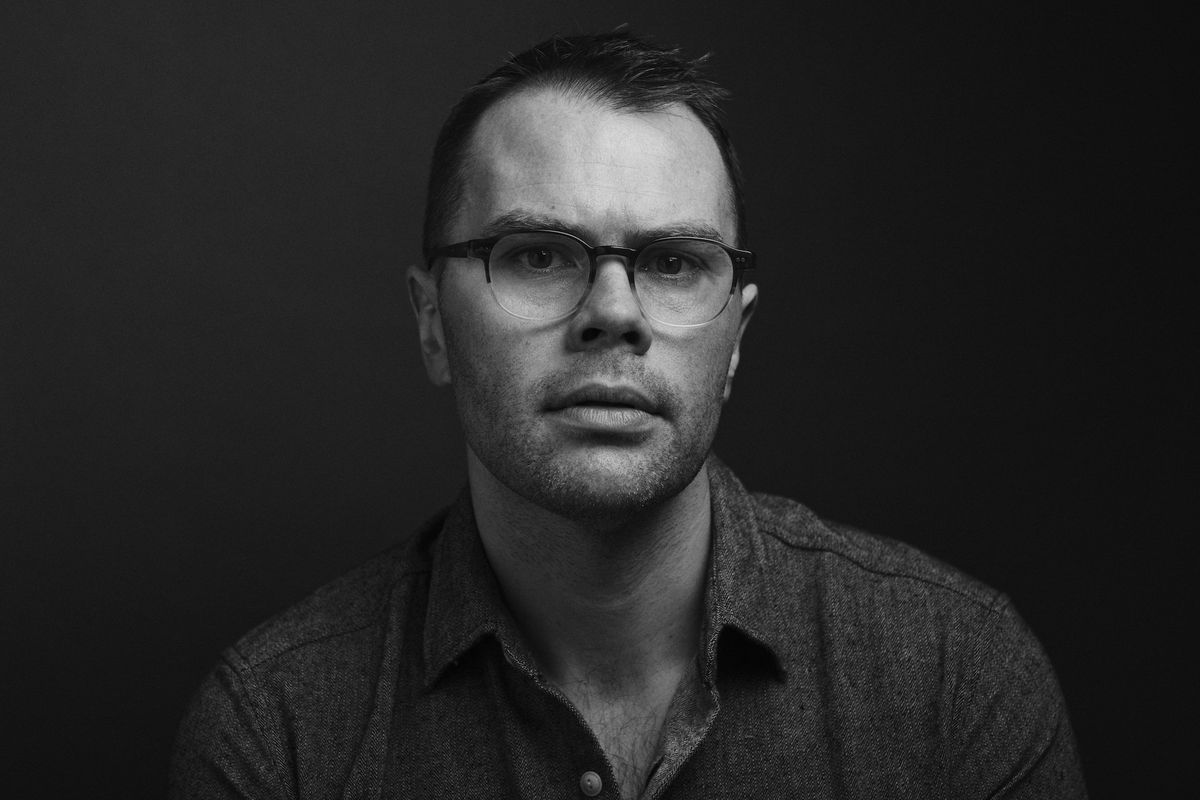‘The Whale’: Idaho-born playwright sees fiction as a safe place to combat personal demons
Samuel D. Hunter’s play “The Whale,” which was produced off-Broadway in 2012, is now a movie. Hunter won a MacArthur Fellowship in 2014. (Courtesy)
Inside a dingy apartment in Moscow, Idaho, a man too big for this world swallows his pain and self-loathing, and eats himself to death.
Charlie’s only connection to the outside world is his friend and nurse Liz, who at one moment berates him for what he’s doing to his body, and in the next hands him two meatball subs from his favorite deli. His students – he teaches writing for an online university – never see his face, or his enormous body, as he begs them to seek honesty in their work; his lies about a broken web cam flying in the face of his exhortations for truth.
He and the pizza delivery guy exchange pleasantries through a closed door, and a young missionary seeks to save his soul, not understanding that Charlie had already been down that road, and is not inclined toward a return trip.
But in his final days, Charlie reaches out to one person, Ellie, the angry, damaged teenage daughter he hadn’t seen in almost a decade, not seeking to save himself, but seeking to save her.
This is the story Samuel D. Hunter tells in “The Whale,” first as his 2012 play and now in a new feature film directed by Darren Aronofsky (“Black Swan,” “Requiem for a Dream,” “Mother!”) and starring Brendan Fraser in a role that is widely expected to earn him his first Oscar nomination for best actor. After the film’s premiere at the Venice Film Festival this summer, the audience greeted Fraser with a six-minute standing ovation.
The film opened in a handful of theaters in larger cities across the country this weekend; it comes to Spokane on Dec. 20.
“I’m so happy the movie is finding open minds and open hearts,” Hunter said in a recent Zoom interview. “It’s been really, really wonderful and really gratifying. The best part is we all really like each other. It was a really wonderful process of making the film. I was on set the entire time. Everybody is so nice, kind of anchored by Brendan, who is such a kind, and gentle and caring guy.”
Hunter, who was born and raised in Moscow and who now lives in New York with his husband and their daughter, often weaves bits of his home state and his own life into his plays, such as “A Bright New Boise,” which is returning to a New York stage in early 2023, “Lewiston,” “Clarkston,” “Pocatello” and “Greater Clements.”
In “The Whale,” Hunter drew on his teenage years as an awkward, overweight young man prone to depression. After struggling to fit in at Moscow High School, he transferred to Logos, a fundamentalist Christian high school, where for a time he said he thrived. School life became more difficult when he began to realize he was gay, “and as I was realizing that this deep part of me that God was not changing, pray as I might, was in fundamental conflict with the community and the theology that propped up that theology.”
The breaking point came his junior year when some friends outed him to the administration and he had to tell his parents he was gay. He returned to Moscow High School, from where he graduated.
“I convinced myself that I had moved past it, I was fine, but I wasn’t, and my depression and eventual self-medication with food really set in ,” he said.
If mining his personal life for inspiration seems brave, Hunter said his intent is to create art that has utility beyond entertainment.
“I want my writing to have use for people, and think there is use in using fiction as a safe space to shadow box our demons,” he said. “It’s the same way sharing the film now. People will come up to me at film festivals and say, ‘I had a loved one who dealt with this,’ or ‘I dealt with this and I connected to it in this way.’
“I wanted to tell this in part because I was self-medicating with food for a long portion of my life, and I still have a very complicated relationship with food. And I also think most people have a complicated relationship with food. It’s something we don’t like to talk about, but I think it’s a discussion worth having.”
“The Whale” is among Hunter’s earliest plays, and the 2012 off-Broadway production won both the 2013 Drama Desk Award and the 2013 Lucille Lortel Award for outstanding play. In 2014, Hunter won a MacArthur Fellowship, aka the “genius grant.”
“The Whale’s” journey from stage to screen took a decade . “It was playing in New York 10 years ago to this day,” Hunter said. “Darren and I were texting back and forth and we figured out that he saw the play exactly 10 years ago last night. So the New York premiere was the 10th anniversary of his seeing the play.”
After the play closed, he got a call that Aronofsky wanted to meet with him. “It was out of the blue. I had no expectations of this becoming a film. I thought the fact that it was playing in an off-Broadway theater was a miracle. It’s like all I ever wanted was to be an off-Broadway playwright,” Hunter said. “It was a good place to start because my expectations were nonexistent.”
As a student in New York University’s dramatic writing program, he focused on theater, but he did take some screenwriting courses. “I was not unfamiliar with the form, but it was very new to me, and certainly the idea of adapting one of my plays into a screenplay was a very new idea,” Hunter said. “In a lot of ways I’m glad it took 10 years, because it kind of took 10 years to figure out how to do it the right way. What I am so grateful for is that Darren never wavered in his faith in me as the writer and also his faith in the story of the play.”
A big part of doing it the right way was finding the perfect cast. Aronofsky looked at a lot of actors over the years, but Fraser was the first “name” performer he suggested to Hunter for the role of Charlie.
“I thought, OK, I need to take this really seriously, because eight years in, this is the first time he’d ever said a name to me,” Hunter said. So Hunter looked into what Fraser had been up to, and found the widely read 2018 GQ profile ”What Ever Happened to Brendan Fraser.” In it, Fraser revealed how he’d been groped by an official with the Hollywood Foreign Press Association, how all those “Mummy” movies damaged his body, how his marriage failed, and how he fell out of favor with Hollywood.
Reading that piece, Hunter saw there was a bit of the same DNA in Charlie as there was in Fraser. “It’s not direct, in the same way I didn’t write something that was directly autobiographical, but there’s something here,” Hunter said.
Aronofsky rented a theater space where Fraser and Sadie Sink, the “Stranger Things” star cast as Charlie’s daughter, Ellie, did a reading of the screenplay.
Hunter described Fraser’s performance as “exquisite.”
“I’ve seen so many people do this role by now, and I know what works and I know what the pitfalls are, and it was so incredible. Brendan, as I’ve learned as I’ve gotten to know him, he’s such a deeply generous and kind human being. And I think his performance puts that on full display,” Hunter said. “But he’s also not afraid of the darker aspects, because he’s lived a life, Brendan has been through a lot, and through it all Brendan has chosen to be a kind and generous human being. He’s not embittered, he’s not cynical, and the same is true of Charlie.”
That inherent optimism was a cornerstone of much of Fraser’s career in the 1990s, when he specialized in playing wide-eyed innocents unleashed into the modern world, whether it was the unfrozen caveman in “Encino Man,” or the hero of “Blast From the Past” who spent 35 years in nuclear fallout shelter, or “George of the Jungle,” which found him swinging through the concrete jungle of San Francisco.
As Charlie, Fraser gives a portrayal of a deeply troubled man who turns to food for comfort after his partner dies. As his health fails, and as his world shrinks, Charlie remains firm in the belief that people are, as his says in the movie, “amazing.”
That notion also is part of Hunter’s DNA.
“I’ve always been somebody who wore his heart on his sleeve. I’m not a cynical person, I’ve never been a cynical person, and I’m not a cynical writer. I’m a pretty earnest writer, I think,” he said.
Hunter decided “Charlie is going to be the kind of person who has faith in other people, no matter what the world does to him, or what the world tells him. That he is going to be this beacon of hope, this shining light in a dark, dark sea, and so I wanted to give him the biggest possible challenge to that hope.”
That challenge lies in Ellie, who is deeply damaged. Cutting and cruel, she lashes out at everyone around her – especially the father who left her and her mother when he fell in love with a man.
“It would be one thing to tell the story of a man trying to reconnect with his daughter and his daughter was immediately, ‘Daddy, daddy I love you,’” Hunter said. “That didn’t feel realistic to me, given the backstory, that he hadn’t seen her in eight years. So I also wanted to make a challenge for the audience. If I make this decision that I don’t want to be a cynical person, I don’t want to write cynical plays, I also don’t want to write plays that give easy answers or deliver platitudes that are hollow.
“I’m more interested in a hope that is more hard won, and a faith in human beings that is more hard won, because I actually think cynicism is the easy choice. It’s so easy to be cynical, and it masquerades as sophistication, it masquerades as intelligence, and I actually think cynicism is intellectually bankrupt, and the harder thing is to have faith in other people. That takes work. And that’s what the story is ultimately about. It takes work to have faith in other people, and it takes work for Charlie to see Ellie for who she truly is.”
The film has come under some criticism for not using an obese actor to play Charlie. But Hunter said filmmakers did all they could to make sure Fraser’s portrayal was as authentic as possible.
“We partnered with an organization called the Obesity Action Coalition, which is an online advocacy organization that works with various experts and seeks to eliminate bias in media toward those who live with obesity,” Hunter said. “Brendan was able to talk with a lot of people who have struggled with weight, who have family members who stories similar to Charlies, who have had bariatric procedures. He talked to dozens of people.
“One of the things that Brendan always says, which I think is so beautiful, is that he learned how strong you have to be to have a body like that.”
Fraser has been open in talking about the uses of prosthetics to make him appear to be a 600-pound man. In a conversation with Adam Sandler for Variety posted last week, he said, “It’s important to say this, because there are those who live with this disease. I felt empowered to be their voice and to be as honest as I could and as authentic as I could in the portrayal. Look, my weight has been all over the map. I put on weight for this role, and it wasn’t enough – so the body (prosthetic) had to go on top of that, and the two worked together.”
The film is set in Moscow, although Hunter admits it’s not a particularly “Idaho” story.
“Charlie could live anywhere in America, and that’s kind of the point,” he said.
It was filmed in Newburgh, New York, about an hour outside of New York City. Still, the set designers made sure there are touches of Moscow in Charlie’s apartment. A tote bag from the independent bookstore Book People of Moscow hangs by Charlie’s door, and one day Liz (Hong Chau) visits wearing a jacket with a Gritman Medical Center logo. Hunter’s favorite thing, and the object he took home from the set at the end of shooting, is a piece of paper on Charlie’s refrigerator that no one will see.
“There’s a flier for a play at the Hartung Theater at the University of Idaho, and the play is called, I think, ‘The Doing is Unduly True,’ and I was like, ‘Is this a real play?’”
He Googled it. Not a real play.
“Someone just created an entirely fictional play. And it’s one of the little details that is totally invisible. It was wonderful the amount of care they took to actually research the real place.”


